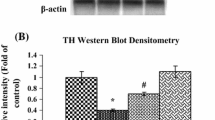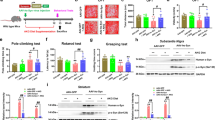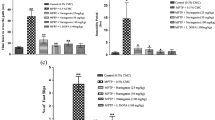Abstract
Parkinson’s disease (PD) is an obstinate progressive neurodegenerative disease and characterized by locomotor impairment and dopaminergic neuronal degeneration in the substantia nigra pars compacta (SNc). We examined in here the dietary effect of nucleoprotein (NP) extracted from salmon soft roe on 1-methyl-4-phenyl-1,2,3,6-tetrahydropyridine (MPTP)-injected PD-like mice model to prevent the symptom as an alternative medicine. Male C57/BL6 mice were given either an artificially modified NP-free diet (NF) or NF supplied with 1.2 % NP for 1 week. Then, mice were injected intraperitoneally four times with 20 mg/kg MPTP. Seven days later, locomotor activity was examined, and the brains were immunostained with tyrosine hydroxylase (TH) and Iba1 antibodies. Moreover, in situ detection of superoxide anion (O2 −) and gene expression of mitochondrial electron transfer chain gene, Cox8b was evaluated in midbrains. NP-fed animals showed significantly reduced locomotor impairment and an increased number of TH-positive cells in the SNc compared with NF animals. The NP-fed animals also showed reduced lower levels of O2 − and up-regulation of Cox8b levels and Iba1 immunoreactivity, suggesting that inflammation and oxidative stress were suppressed and mitochondrial impairment was relieved in these animals. Supplementation of the diet with NP may serve as a useful preventive measure to slow the onset of PD.






Similar content being viewed by others
Abbreviations
- DAergic:
-
Dopaminergic
- HEt:
-
Hydroethidine
- MPP+ :
-
1-Methyl-4-phenylpyridinium
- MPTP:
-
1-Methyl-4-phenyl-1,2,3,6-tetrahydropyridine
- NF:
-
Nucleoprotein-free
- NP:
-
Nucleoprotein
- O2 − :
-
Superoxide anion
- PD:
-
Parkinson’s disease
- ROS:
-
Reactive oxygen species
- SNc:
-
Substantia nigra pars compacta
- TH:
-
Tyrosine hydroxylase
References
Bindokas VP, Jordán J, Lee CC, Miller RJ (1996) Superoxide production in rat hippocampal neurons: selective imaging with hydroethidine. J Neurosci 16(4):1324–1336
Chen TH, Wang MF, Liang YF, Komatsu T, Chan YC, Chung SY, Yamamoto S (2000) A nucleoside-nucleotide mixture may reduce memory deterioration in old senescence-accelerated mice. J Nutr 130:3085–3089
Chung YC, Kim SR, Park JY, Chung ES, Park KW, Won SY, Bok E, Jin M, Park ES, Yoon SH, Ko HW, Kim YS, Jin BK (2011) Fluoxetine prevents MPTP-induced loss of dopaminergic neurons by inhibiting microglial activation. Neuropharmacology 60(6):963–974
Dauer W, Przedborski S (2003) Parkinson’s disease: mechanisms and models. Neuron 39(6):889–909
Goldberg NR, Hampton T, McCue S, Kale A, Meshul CK (2011) Profiling changes in gait dynamics resulting from progressive 1-methyl-4-phenyl-1,2,3,6-tetrahydropyridine-induced nigrostriatal lesioning. J Neurosci Res 89(10):1698–1706
Hernandez TD, Schallert T (1988) Seizures and recovery from experimental brain damage. Exp Neurol 102(3):318–324
Hirsch EC, Hunot S (2009) Neuroinflammation in Parkinson’s disease: a target for neuroprotection? Lancet Neurol 8(4):382–397
Hori M, Nakamachi T, Rakwal R, Shibato J, Nakamura K, Wada Y, Tsuchikawa D, Yoshikawa A, Tamaki K, Shioda S (2012) Unraveling the ischemic brain transcriptome in a permanent middle cerebral artery occlusion mouse model by DNA microarray analysis. Dis Model Mech 5(2):270–283
Khan MM, Kempuraj D, Thangavel R, Zaheer A (2013) Protection of MPTP-induced neuroinflammation and neurodegeneration by Pycnogenol. Neurochem Int 62(4):379–388
Langston JW (1996) The etiology of Parkinson’s disease with emphasis on the MPTP story. Neurology 47(6 Suppl 3):S153–S160
Matsunaga M, Ohtaki H, Takaki A, Iwai Y, Yin L, Mizuguchi H, Miyake T, Usumi K, Shioda S (2003) Nucleoprotamine diet derived from salmon soft roe protects mouse hippocampal neurons from delayed cell death after transient forebrain ischemia. Neurosci Res 47(3):269–276
Meredith GE, Totterdell S, Petroske E, Santa CK, Callison RC, Lau YS (2002) Lysosomal malfunction accompanies alpha-synuclein aggregation in a progressive mouse model of Parkinson’s disease. Brain Res 956(1):156–165
Mosley RL, Hutter-Saunders JA, Stone DK, Gendelman HE (2012) Inflammation and adaptive immunity in Parkinson’s disease. Cold Spring Harb Perspect Med 2(1):a009381
Murakami K, Kondo T, Kawase M, Li Y, Sato S, Chen SF, Chan PH (1998) Mitochondrial susceptibility to oxidative stress exacerbates cerebral infarction that follows permanent focal cerebral ischemia in mutant mice with manganese superoxide dismutase deficiency. J Neurosci 18(1):205–213
Ohtaki H, Takeda T, Dohi K, Yofu S, Nakamachi T, Satoh K, Hiraizumi Y, Miyaoka H, Matsunaga M, Shioda S (2007) Increased mitochondrial DNA oxidative damage after transient middle cerebral artery occlusion in mice. Neurosci Res 58(4):349–355
Ohtaki H, Yofu S, Nakamachi T, Satoh K, Shimizu A, Mori H, Sato A, Iwakura Y, Matsunaga M, Shioda S (2010) Nucleoprotein diet ameliorates arthritis symptoms in mice transgenic for human T-cell leukemia virus type I (HTLV-1). J Clin Biochem Nutr 46(2):93–104
Seehafer SS, Pearce DA (2006) You say lipofuscin, we say ceroid: defining autofluorescent storage material. Neurobiol Aging 27(4):576–588
Singer TP, Castagnoli N, Ramsay RR, Trevor AJ (1987) Biochemical events in the development of parkinsonism induced by 1-methyl-4-phenyl-1,2,3,6-tetrahydropyridine. J Neurochem 49(1):1–8
Speciale SG (2002) MPTP: insights into Parkinsonian neurodegeneration. Neurotoxicol Teratol 24(5):607–620
Sudo N, Aiba Y, Takaki A, Tanaka K, Yu XN, Oyama N, Koga Y, Kubo C (2000) Dietary nucleic acids promote a shift in Th1/Th2 balance toward Th1-dominant immunity. Clin Exp Allergy 30(7):979–987
Tanaka S, Ishii A, Ohtaki H, Shioda S, Yoshida T, Numazawa S (2013) Activation of microglia induces symptoms of Parkinson’s disease in wild-type, but not in IL-1 knockout mice. J Neuroinflammation 10:143
Taylor JM, Main BS, Crack PL (2013) Neuroinflammation and oxidative stress: co-conspirators in the pathology of Parkinson’s disease. Neurochem Int 62(5):803–819
Tipton KF, Singer TP (1993) Advances in our understanding of the mechanisms of the neurotoxicity of MPTP and related compounds. J Neurochem 61(4):1191–1206
Turski L, Bressler K, Rettig KJ, Löschmann PA, Wachtel H (1991) Protection of substantia nigra from MPP+ neurotoxicity by N-methyl-D-aspartate antagonists. Nature 349(6308):414–418
Wu DC, Teismann P, Tieu K, Vila M, Jackson-Lewis V, Ischiropoulos H, Przedborski S (2003) NADPH oxidase mediates oxidative stress in the 1-methyl-4-phenyl-1,2,3,6-tetrahydropyridine model of Parkinson’s disease. Proc Natl Acad Sci U S A 100(10):6145–6150
Yofu S, Ogawa T, Nakamachi T, Satoh K, Shimizu A, Matsunaga M, Shioda S (2010) Nucleoprotein diet prevents LPS-induced liver injury in mice. Jpn J Appl Physiol 40(3):137–143
Acknowledgments
This work was supported in part by the MEXT-Supported Program for the Strategic Research Foundation at Private Universities, 2008–2012.
Author information
Authors and Affiliations
Corresponding author
Rights and permissions
About this article
Cite this article
Kiriyama, K., Ohtaki, H., Kobayashi, N. et al. A Nucleoprotein-Enriched Diet Suppresses Dopaminergic Neuronal Cell Loss and Motor Deficit in Mice with MPTP-Induced Parkinson’s Disease. J Mol Neurosci 55, 803–811 (2015). https://doi.org/10.1007/s12031-014-0432-2
Received:
Accepted:
Published:
Issue Date:
DOI: https://doi.org/10.1007/s12031-014-0432-2




